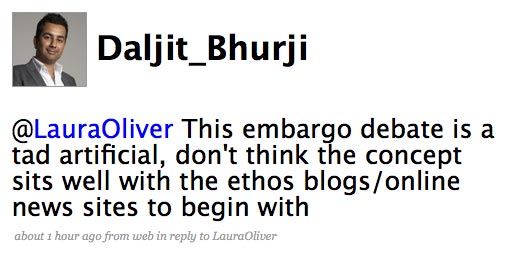TechCrunch’s announcement that it will break every embargo it agrees to has caused something of a stir amongst PR and journo bloggers alike.
TC’s Michael Arrington explained the good, the bad and the ugly side of embargoed news releases:
“A lot of this news is good stuff that our readers want to know about. And we have the benefit of taking some time during the pre-briefing to think about the story, do research, and write it properly. When embargoes go right, we get to write a thoughtful story which benefits the company and our readers.
“But there’s a problem. All this stress on the PR firms put on them by desperate clients means they send out the embargoed news to literally everyone who writes tech news stories. Any blog or major media site, no matter how small or new, gets the email. It didn’t used to be this way, but it’s becoming more and more of a problem. As the economy turns south, PR firms are under increasing pressure to perform and justify their monthly retainers which range from $10,000 to $30,000 or more. In short, they have to spam the tech world to get coverage, or lose their jobs.”
Increased competition in the journalism industry is causing more and more embargoes to be broken, argues Arrington, creating ‘a race to the bottom by new sites’ and a climate in which, he says, TC can’t operate.
Certain ‘trusted’ companies and PR firms will continue to have their embargoes honoured by the site, but the hope is that by disregarding the rules firms will have to be more selective with who they break news to and clamp down on those repeat offenders breaking embargoes.
Arrington will also be posting a blacklist – now topped by TC – listing all firms and publications involved when an embargo is broken.
ReadWriteWeb has come back on Arrington’s decision, saying it will honour embargoes. While the site agrees that the press should get better at respecting them, RRW says embargoes give more outlets a chance to cover a story, providing multiple perspectives for readers.
“They give multiple blogs a chance to review a technology in depth, instead of making it a race (…) Embargoes lead to more total coverage than exclusives (…) Exclusives are the tactic of people with weak products and of reporters who compete better in bullying than in writing.”
Journalism.co.uk receives its fair share of embargoed news and releases – and has never knowingly broken any, because we want to cultivate good relations with tipsters, companies and PR firms.
This doesn’t mean we’ll cover everything that gets sent our way. We also know other journalism news sites will be getting much of the same info and agree this can make it more of a race to get the news out.
But from our perspective: we have two full-time journalists, so having good contacts with companies and PR is vital to our expanding our newsgathering.
However, as a twittered reply from @Daljit_Bhurji, founder of Diffusion PR, suggests, does the old-fashioned embargo model really work for online?

Reporting on our specialism – as I’m sure is the case with many other subject-specific publications – it’s increasingly apparent that the organisations/titles/companies we write about are becoming their own news sources. e.g. have their own press office, press release feed, blog/write about their own developments.
Sending an embargoed release about this info to us later isn’t a great help. Most of the time I’d rather learn about it if it’s covered in a blog-style like the BBC Editors blog or Guardian’s Inside blog.
We’re then free to dig deeper into that news if needs be and are given a direct line to the people behind it; or pass it on through another of our channels like Editors’ Pick.
Holding back the news tide with embargoes seems to go against the way information and news spreads online through links, official ‘leaks’ (as referred to above), blog networks etc.
What’s more it’s not just quote-unquote journalists covering news releases any more – is the industry expecting other writers and bloggers online to respect embargoes? It goes against the grain of the web.
Are embargoes redundant in the online age?